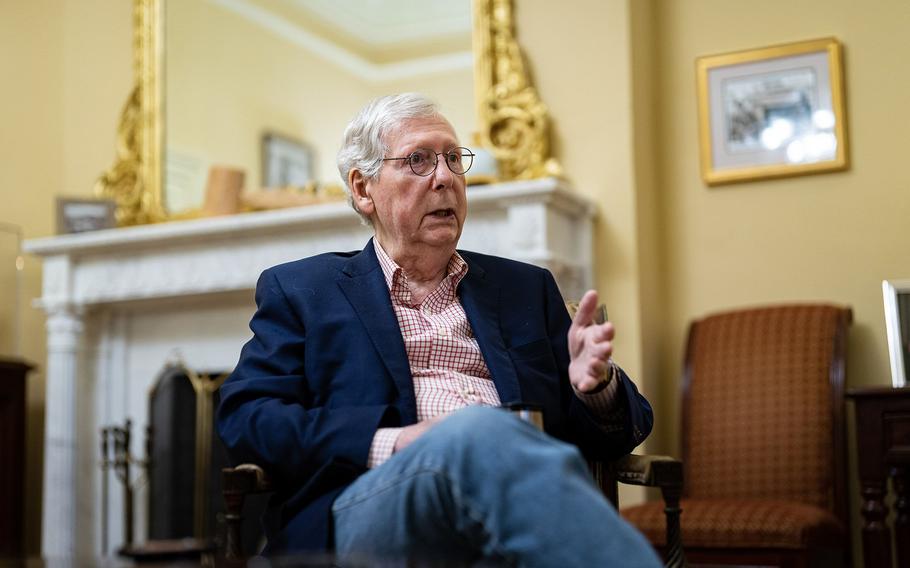
Mitch McConnell during an interview at the U.S. Capitol in Washington, on May 8, 2023. (Al Drago/Bloomberg)
Senate Republican leader Mitch McConnell predicted U.S. funding to support Ukraine’s military will continue to flow despite growing calls from isolationist members of his own party to reduce or end aid to Kyiv.
“I do think that we have enough support within Congress to sustain this for a good deal longer,” McConnell said. “All the leadership in the House and Senate in my party is very much in favor of defeating the Russians.”
The Kentucky Republican, who has negotiated more than $100 billion in U.S. assistance for the war effort, also called on President Joe Biden to accelerate shipments of high-tech weaponry to the country before an expected spring offensive planned by Ukraine to retake territory seized by Russia.
Yet Republican voters are deeply split on funding for Ukraine. And the top-polling Republicans in the approach to next year’s presidential primaries — former president Donald Trump and Florida Governor Ron DeSantis — have wobbled on U.S. support for Ukraine. In March, DeSantis, responding to a questionnaire from then-Fox News host Tucker Carlson, said the war was not a vital U.S. interest.
First elected to the Senate in 1984, McConnell’s politics — and his hawkish stances on foreign policy and defense — more closely resemble those of Republican standard bearers during the Cold War than they do the upstarts in today’s party.
But McConnell, who is widely unpopular among Trump-aligned Republicans, said he senses a shift within the party.
“I do think the party of Ronald Reagan is coming back here,” McConnell said Monday in an interview at his office in the U.S. Capitol. “I think the one good thing that’s come out of this is a renewed belief that national security is important.”
His distrust of Russia, in particular, runs deep. His father served with Gen. George Patton in World War II and wrote letters home regarding his concerns about the Russians, said McConnell, who was born in 1942.
Even as relations between the two superpowers thawed, McConnell for years warned “Russia is not our friend” and has repeatedly singled out Russian President Vladimir Putin as a U.S. adversary.
He applauded last week when Speaker Kevin McCarthy told a Russian reporter he would continue to support Ukraine aid. McCarthy had previously said the U.S. would not write Ukraine a “blank check.”
McConnell also was heartened that a recent letter questioning aid to Ukraine was signed by just three Republican senators. He dismissed them as “outliers.”
‘Holiday from history’
Lately McConnell has repeatedly cited another Cold War warrior — former defense secretary Robert Gates — that the Ukraine war ended America’s “holiday from history.”
McConnell specifically called out Carlson, a frequent critic of Ukraine aid and Republican leadership in Congress, who was recently fired by Fox.
“At the risk of patting myself on the back, not many Republicans went after Tucker Carlson, but I did,” McConnell said. “I think Carlson had developed a coterie of followers in the Congress as well as in the country that I found disturbing.”
McConnell has warned that Russia winning in Ukraine would embolden Putin and heighten the risk China would attack Taiwan. He called the U.S. investment in Ukraine’s military a “bargain” if Ukraine is able to defeat Russia.
McConnell has taken a leading role internationally as well, visiting President Volodymyr Zelenskiy in Kyiv last year and traveling to Finland and Sweden, where he encouraged their leaders to join NATO. A few months later, he engineered Senate ratification of NATO’s expansion, 95 to 1.
All of that has earned him rare plaudits from Senate Majority Leader Chuck Schumer and other Democrats.
“For Senator McConnell to take a leadership position on this is critically important,” said Senator Dick Durbin of Illinois, the No. 2 Senate Democrat.
McConnell and Biden
“I like Joe Biden personally,” McConnell is quick to say about the president, with whom he has brokered several compromises, including last year’s bipartisan infrastructure bill.
Yet McConnell has been frustrated with Biden for taking months to approve each new weapon system — from Himars rockets to Abrams tanks.
McConnell urged Biden well before Russia’s February 2022 invasion to step up military aid to Ukraine and counter Russia, saying in January 2021 the new administration would have “willing partners on Capitol Hill” to do so.
In April 2021, he warned against cutting U.S. defense spending with Russian troops massing on Ukraine’s border. And in July, he assailed Biden’s decision to allow Russia’s Nord Stream 2 gas pipeline to escape crippling sanctions.
By December 2021, McConnell made a more explicit plea for Ukraine air defenses, and in the weeks before the invasion, again urged Biden to rush weapons into the country.
More recently, he’s called on Biden to provide fighter jets, cluster bombs and longer-range munitions. He said he sees Biden as “skittish” about exercising American power.
McConnell said Biden has generally come around to do the right thing on Ukraine — just not, in his opinion, soon enough.